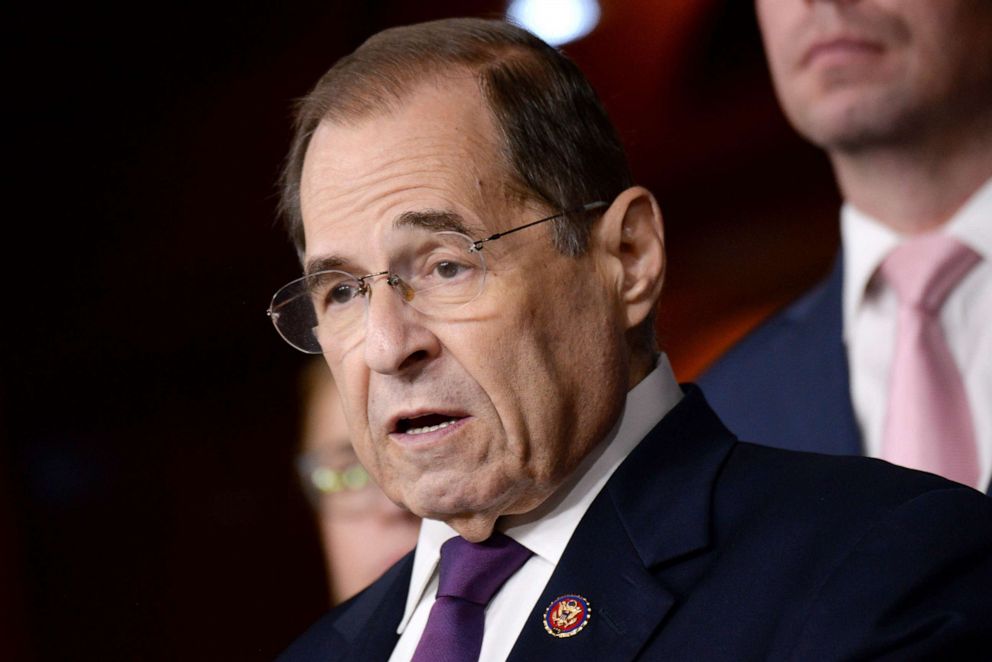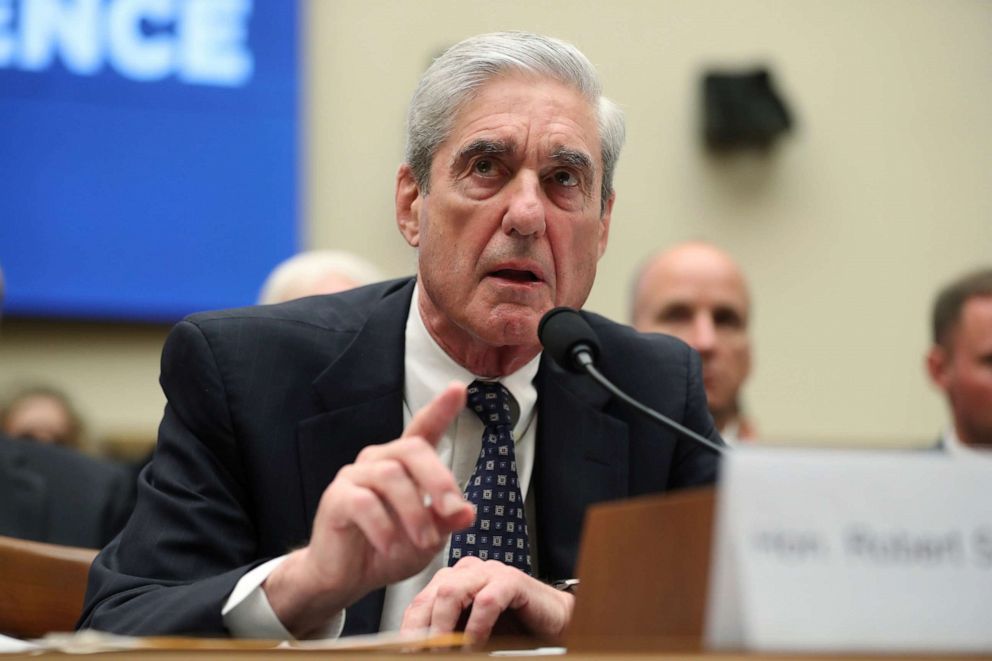House Democrats file lawsuit to enforce subpoena for McGahn testimony
His lawyer said McGahn would follow White House direction not to testify.
House Democrats on Wednesday filed a lawsuit to enforce their subpoena demanding former White House counsel Donald McGahn's testify, sharply escalating their dispute with the White House by sending the fight over a key witness in special counsel Robert Mueller's report to court for a resolution.
The White House has continued to refuse to allow McGahn, who spent more than 30 hours with Mueller's investigators, to testify publicly – a key demand of Democrats who are planning additional public hearings for the fall as they continue their obstruction investigation and contemplate pursuing impeachment.
White House lawyers and Democratic committee attorneys have battled up and down Pennsylvania Avenue for months over access to McGahn and other witnesses and documents in the committee's investigation.
On a call with reporters Wednesday, one Democratic committee official repeatedly compared McGahn to John Dean, the former White House counsel who testified before Congress against President Richard Nixon during the Watergate scandal and pleaded guilty to obstruction of justice. McGahn's attorney, however, said in a statement that McGahn doesn't believe he witnessed any violation of the law.
McGahn is the "most important fact witness" in the Mueller investigation and the "most critical witness against the president on every level," an official said on the call.
"People should not forget that Don McGahn is a lawyer and has an ethical obligation to protect client confidences, and as I have said before, Don does not believe he witnessed any violation of law," his attorney, William Burck, said in a statement. "And the President instructed Don to cooperate fully with the Special Counsel but directed him not to testify to Congress unless the White House and the Committee reached an accommodation. When faced with competing demands from co-equal branches of government, Don will follow his former client's instruction, absent a contrary decision from the federal judiciary," Burck said.
White House counsel Pat Cipollone has said "that McGahn is absolutely immune from compelled congressional testimony with respect to matters occurring during his service as a senior adviser to the President," citing previous Department of Justice Office of Legal Counsel opinions, along with OLC guidance specific to McGahn's testimony.
Democrats argued in their filing that the "absolute immunity" argument has "no grounding in the Constitution, any statutes, or case law" and say the president cited "no legal authority" for McGahn -- a private citizen -- to defy a congressional subpoena.
Though there have been lighthearted moments in the negotiations -- at a June meeting on the White House campus, Norm Eisen, a Democratic committee lawyer, joked that the group, seated around a round table, were thus on equal footing and well-positioned to strike deal -- talks have largely stalled over the scope of the inquiry following Mueller's July testimony.
In private conversations with Eisen and Barry Berke, a prominent New York City defense attorney hired by committee Democrats to handle oversight matters, attorneys with the White House counsel's office have pushed back on Democrats' insistence on a public appearance, potentially leaving open the possibility of a closed door hearing on select pieces of Mueller's report, should Democrats agree to do so, according to sources familiar with the discussions.
Sources told ABC News the White House is open to having McGahn speak to the committee about the Mueller report, but only behind closed doors and they won't engage in further discussions with the committee about his testimony unless Democrats drop their demand for a public setting.
Democrats detailed their months of negotiations, writing that the White House and McGahn's personal attorney rejected their efforts to secure McGahn's public testimony. "After months of attempted accommodation, the Judiciary Committee and McGahn are therefore now at an impasse."
Discussions between Democrats and the White House over the committee's document request to McGahn have also continued but are unlikely to proceed in the wake of the new lawsuit, White House and Republican sources predicted.
"Democrats' decision to unilaterally end the accommodations process and file a lawsuit serves only to shut off this committee's access to White House and DOJ documents," the top Republican on the House Judiciary Committee, Doug Collins, R-Ga., said in a statement, "Their insistence on having Don McGahn testify publicly before the cameras further proves they are only interested in the fight and public spectacle of an investigation, but not actually in obtaining any real information."
A White House spokesperson declined to comment on the internal negotiations.

Mueller had requested to speak with McGahn about the circumstances surrounding former FBI Director James Comey's firing and his reported involvement in the events surrounding former Attorney General Jeff Sessions' recusal from the Russia investigation. ABC News previously reported that McGahn was among the White House staffers who were against any notion of Trump's firing of Mueller in June 2018 when the president wanted to do just that.
"McGahn, who was the White House Counsel during the relevant period, is the most important witness, other than the President, to the key events that are the focus of the Judiciary Committee's investigation," the lawsuit states.
Democrats see public testimony from McGahn and other prominent Trump figures as key elements of their post-Mueller obstruction of justice investigation as they determine whether to take up impeachment against the president. More than half of House Democrats now back formal impeachment proceedings, putting new pressure on Democratic leaders to take action.
"The Judiciary Committee is now determining whether to recommend articles of impeachment against the President based on the obstructive conduct described by the Special Counsel," the lawsuit reads. "But it cannot fulfill this most solemn constitutional responsibility without hearing testimony from a crucial witness to these events: former White House Counsel Donald F. McGahn II."
"There is continuing interest to hear from everyone we can," Rep. David Cicilline, D-R. I., a member of the committee, told ABC News, adding that the panel hopes to question former Trump aide Hope Hicks again and former Trump campaign manager Cory Lewandowski in the coming weeks.
The committee is expected to subpoena Lewandowski for testimony in the coming weeks, sources told ABC News. Lewandowski would be willing to testify publicly before the committee, but his attorney is encouraging him only to speak about his time working for Trump on the campaign, not about any conversations he had with Trump as president, sources said.
The committee already questioned Hicks behind closed doors in June for seven hours, but she refused to answer questions about several key incidents related to Trump's potential obstruction of justice investigated by Mueller. Democrats on the committee said lawyers representing the Trump administration blocked Hicks from answering questions 155 times. Hicks' subpoena was for public testimony, but during negotiations the committee agreed to interview her privately.
McGahn's former chief of Staff, Annie Donaldson, also answered written questions from the Judiciary Committee. Democrats said the Trump administration blocked her from answering questions 212 times as it related to questions about the president's misconduct detailed in Mueller's report.
In late July, the House Judiciary Committee petitioned a federal judge to release grand jury material from Mueller's investigation as part of the process to determine whether to take up impeachment.

"We'll have hearings in September and October with people … who are not dependent on the court proceedings," Nadler said Monday in an appearance on MSNBC. "If we decide to report articles of impeachment we could get to that in the late fall, perhaps in the latter part of the year."
Pelosi has cautioned Democrats against considering impeachment without bipartisan support or overwhelming public approval. Additional hearings with "fact-witnesses," Democrats argue, could continue to highlight Trump's actions and Mueller's findings for the public.
"We will hold these hearings. We will get the support of the American people or we won't. I suspect we will," Nadler said. "If we do, and we can show that this president ought to be impeached and we support it, and we vote for impeachment."
"If the Senate doesn't then we'll defeat a lot of Republican senators next year because they will show themselves to be lapdogs of the president," he said.




